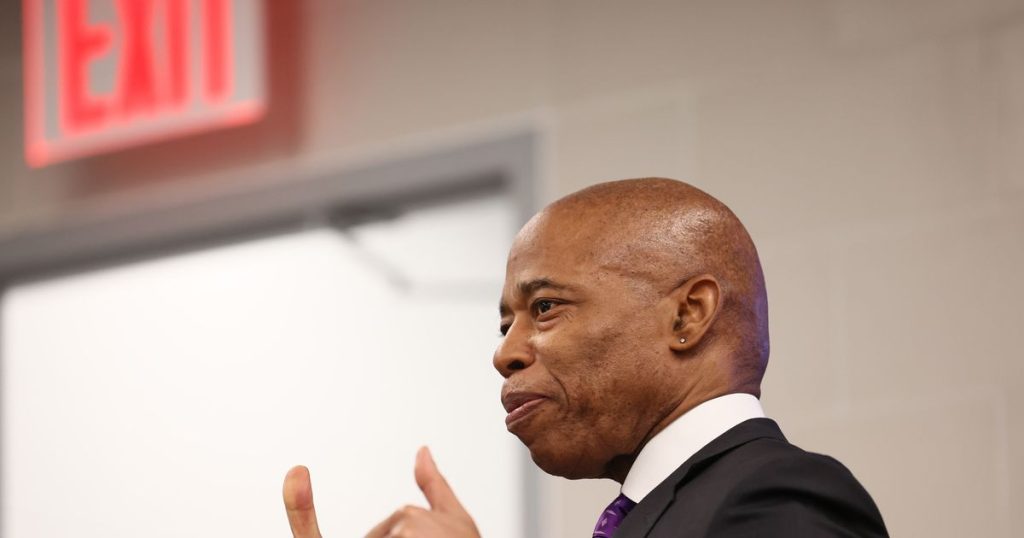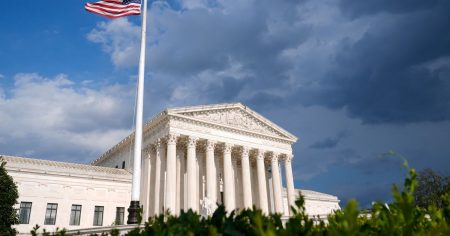A High-Stakes Legal Battle: The Corruption Case Against NYC Mayor Eric Adams
The Appointment of Paul Clement: A Conservative Legal Heavyweight
In a dramatic twist in the corruption case involving New York City Mayor Eric Adams, District Court Judge Dale Ho has appointed Paul Clement, a prominent conservative lawyer, to argue against the Department of Justice’s (DOJ) decision to dismiss the charges against Adams. This move comes as Judge Ho grapples with the controversial nature of the case, which has sparked allegations of political favoritism and quid pro quo arrangements. Clement, a well-known figure in conservative legal circles, is tasked with providing an adversarial perspective to the DOJ’s request to drop the charges without prejudice. His role is to challenge the government’s position and argue against the dismissal, ensuring that the court has a robust opposing view to consider.
Clement’s appointment is significant, given his credentials as a former Solicitor General under President George W. Bush and his reputation as a skilled litigator. His involvement adds a layer of complexity to the case, as he is expected to rigorously question the government’s motives and the terms under which the charges are being dismissed. This move by Judge Ho reflects his commitment to ensuring that the legal process remains fair and transparent, even when the government is seeking to drop charges.
The Controversy Surrounding the Case Dismissal
The dismissal of the corruption charges against Mayor Adams has been shrouded in controversy, with allegations suggesting that the decision may have been influenced by political considerations. At the heart of this controversy is the claim that Adams’ legal team proposed a deal with the Trump administration, wherein the charges would be dropped in exchange for Adams’ cooperation in implementing the administration’s mass deportation policies in New York City. While both the DOJ and Adams’ legal team have denied these allegations, they have nonetheless fueled public skepticism and raises questions about the integrity of the Justice Department’s decision-making process.
The allegations first came to light through the resignation letter of Danielle Sassoon, the acting U.S. Attorney for the Southern District of New York. Sassoon, a Trump appointee and former clerk for the late Justice Antonin Scalia, claimed that Adams’ lawyers had proposed such a deal. Her resignation and the subsequent revelation of these allegations have added fuel to the fire, with many questioning whether the DOJ’s decision to dismiss the charges was motivated by political expediency rather than a genuine assessment of the case’s merits.
The Role of Judge Dale Ho: Navigating a Complex Legal Landscape
Judge Dale Ho, who is presiding over the case, finds himself in a difficult position as he seeks to determine the appropriate course of action. The decision to appoint Paul Clement as an outside counsel is a rare move, reflecting Ho’s recognition of the unusual nature of the case and the need for an independent perspective. While courts generally defer to the government’s discretion in deciding whether to bring or drop charges, Ho is seeking to ensure that the dismissal of the charges against Adams is not merely a rubber-stamp of the DOJ’s decision, but rather a thoroughly vetted and legally sound outcome.
Ho’s decision to bring in Clement is also a testament to the importance of adversarial testing in the legal process. In his brief, Ho emphasized that the absence of such testing in this case makes it particularly challenging for the court to evaluate the government’s position and the terms of the requested relief. By appointing Clement, Ho is addressing this gap and ensuring that the court has access to a robust opposing argument, which is essential for making an informed and just decision.
Enter Paul Clement: A Star in Conservative Legal Circles
Paul Clement, a highly respected and accomplished lawyer, brings a wealth of experience to the case. Having served as Solicitor General from 2004 to 2008, Clement has argued numerous high-profile cases before the Supreme Court and is well-versed in the intricacies of federal law. His involvement in the case is likely to bring a level of scrutiny and rigor that will test the government’s arguments and ensure that the court is fully informed.
Clement’s task is twofold: first, to argue that Judge Ho has the authority to deny the dismissal of the charges, and second, to advocate for the dismissal to be with prejudice, meaning that the charges cannot be refiled in the future. This would effectively prevent the charges from lingering over Adams and would bring finality to the case. Clement’s arguments will likely focus on the legal precedents and statutory authority that govern the dismissal of charges, as well as the broader implications of allowing the government to drop charges without sufficient justification.
The Broader Implications of the Case
The outcome of this case will have significant implications for the administration of justice and the rule of law. If the court allows the charges to be dismissed without prejudice, it could set a precedent that emboldens future administrations to use the Justice Department as a tool for political leverage. Conversely, if the court decides to deny the dismissal or impose stricter terms, it could send a strong message about the independence of the judiciary and the need for transparency in governmental decision-making.
Public trust in the legal system is also at stake. The allegations of political interference in the case have already eroded confidence in the Justice Department’s independence. A fair and transparent resolution to the case is essential to restoring public faith in the integrity of the legal process. Judge Ho’s decision to appoint an independent counsel like Paul Clement is a step in the right direction, as it demonstrates a commitment to ensuring that the case is handled with the utmost seriousness and scrutiny.
Moving Forward: The Path to Resolution
As the case progresses, all eyes will be on Judge Ho’s decision and the arguments presented by Paul Clement. The coming weeks will likely see a series of legal filings and court hearings, as Clement challenges the government’s position and pushes for a more rigorous examination of the dismissal. The outcome of this case will not only determine the fate of the charges against Mayor Adams but also set an important precedent for how similar cases are handled in the future.
In the end, the resolution of this case will depend on Judge Ho’s interpretation of the law and his assessment of the arguments presented by both sides. While the allegations of political interference loom large, the court’s focus will remain on the legal merits of the dismissal and the authority of the judiciary to oversee the process. As the legal drama unfolds, one thing is clear: the stakes are high, and the outcome will have far-reaching consequences for justice, accountability, and the integrity of the legal system.















